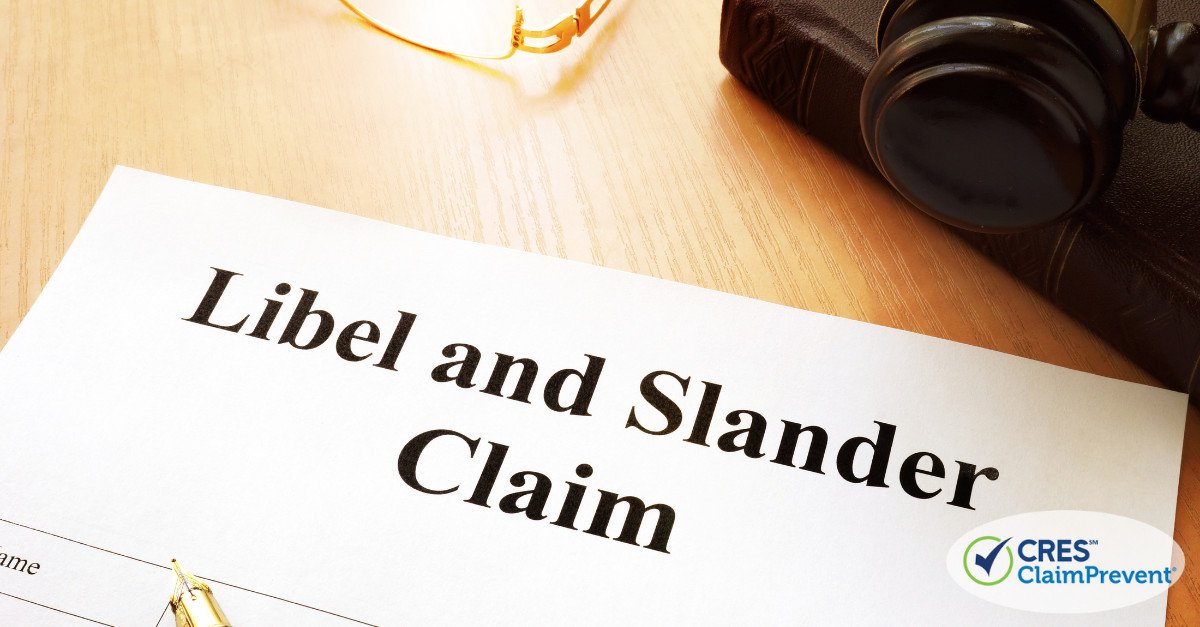As a broker, you can be held responsible for something one of your team says or does. Slander and libel are real concerns, and if one of your team does something wrong, you could find yourself facing a lawsuit as the broker.
There’s a fine line between freedom of speech and defaming someone’s character. Brokers must educate their teams about slander and libel and ensure you have policies in place to prevent those issues from happening. REALTORS® also have additional obligations they must comply with.
Here’s what you can do to minimize your risk of legal action and protect your real estate business (and reputation).
Understand What Defamation, Slander and Libel Are
Defamation is an umbrella term used to describe any actions taken to hurt another person’s reputation. When a false statement is spoken, it’s slander. When it’s published, it’s libel. If you or one of your real estate licensees says or publishes something defamatory, the affected party may sue the licensee (and you) for damages. The courts shall determine whether the statement was based on fact or a lie. For it to be considered defamatory, the statement must be false. To be eligible for any damages, the false statement must have caused the person hardship, such as reputational damage, ridicule, or being ostracized.
The Consequences
All forms of defamation and the spread of untrue information can cause great reputational damage to the affected person. Imagine if someone intentionally lied and told the world that your brokerage or one of your licensees was involved in illegal or unethical activity? The effects would be wide-reaching, and you may find yourself in need of a good lawyer and a new occupation.
Back in 2008, a Las Vegas REALTOR® sued USA Today for an article about mortgage fraud that featured a home she sold. The article resulted in the termination of her role due to bad publicity, and she was unable to find other employment in the industry.
If a client, another licensee, or anyone slaps you with a lawsuit for slander or libel, it can hurt your reputation just as badly. It will also have a financial impact, especially if you lose the case. There are legal costs and, if the claimant wins the case, you will need to pay their costs as well. Depending on the seriousness of the defamation, you could be facing a costly damages bill that could potentially put you out of business.
Tips to Create a Slander and Libel-free Culture
The consequences are dire if you lose a case for slander and libel, so it makes sense to try and avoid it from happening within your brokerage. Here are some tips to create a slander and libel-free culture:
Create a positive workplace environment
Lead by example and provide a supportive and positive workplace for your team. A positive workplace is one with strong leadership and mentoring to enable growth and collaboration.
Educate your team
Ensure your team members are aware of what is expected of them as part of your onboarding process. Your expectations about freedom of speech vs. slander and libel must be clear to ensure your real estate business is protected.
If you have a code of conduct, make sure your real estate licensees know exactly what behaviors are acceptable and which are not. If you’re affiliated with the National Association of REALTORS®, you can refer to the REALTORS® Code of Ethics & Standards of Practice.
Understand the Additional Obligations of REALTORS®
Article 15 of the National Association of REALTORS® Code of Ethics & Standards of Practice states that “REALTORS® shall not knowingly or recklessly make false or misleading statements about other real estate professionals, their business, or their business practices”. This obligation extends to sharing, repeating, and republishing false or misleading statements made by others either in person, in writing or electronically.
REALTORS® also have an obligation to publish a clarification and/or remove statements made by others on electronic media when they discover that a statement is misleading or false.
Communicate the consequences
Some real estate licensees, particularly those early in their career, may think that making statements about another broker, licensee or client is simply freedom of speech. Ensure all of your real estate licensees understand what the consequences are for slander and libel — for them, for you, legally, financially, and for the reputation of all involved.
Protect Your Real Estate Brokerage
Do you have processes in place to help protect you and your team from lawsuits? Have you created a slander and libel-free culture in your workplace? Even if you have, you still need to have adequate insurance in place.
A CRES real estate Errors and Omissions Insurance policy will protect you in case a claim is made against you for slander or libel. You can also tailor an insurance package to suit the many risks that you and your team face in your real estate business.
Your CRES E&O + ClaimPrevent® policy also provides you with free legal advice when you need it. You can speak to one of our highly qualified and experienced real estate attorneys any day of the week. This means you can get pre-claim advice to help prevent lawsuits.
Would you like to speak to a CRES insurance professional about your insurance needs? Contact us at 800-880-2747 for a confidential discussion today and our team will guide you through the insurance options available to suit your business.
As part of one of the largest insurance brokers in the world, we have unparalleled access to options others just don’t have. Let us find you the best coverage for the best price.
